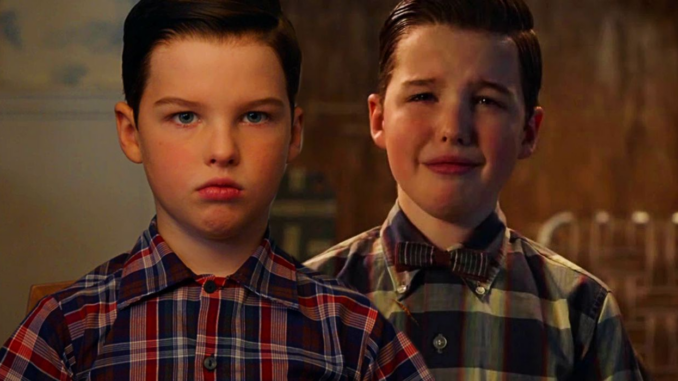
Introduction
When you think of The Big Bang Theory, what comes to mind? Geeky humor, lovable characters, and scientific banter, right? Now think of Young Sheldon—the same Sheldon Cooper, but as a child navigating the complexities of growing up. While The Big Bang Theory leaned heavily into comedy, Young Sheldon takes a much more dramatic and heartfelt approach. You might be wondering, what’s the secret behind this shift in tone? Why does Young Sheldon often feel more emotionally charged than its predecessor?
In this article, we’ll dive into the secret reason Young Sheldon is more dramatic than The Big Bang Theory and how this dynamic impacts the storytelling, characters, and overall tone of the show.
H1: The Key Difference: The Focus on Family and Growing Up
H2: The Emotional Depth of Sheldon’s Childhood
One of the most significant reasons Young Sheldon leans more into drama is the simple fact that it focuses on Sheldon’s childhood. Unlike The Big Bang Theory, where Sheldon’s life is already in full swing as an adult, Young Sheldon takes viewers through the formative years that shaped him into the quirky, socially awkward genius we know. The drama in Young Sheldon stems from watching a young Sheldon struggle with fitting in, understanding social cues, and dealing with his family’s challenges.
While The Big Bang Theory focused on adult relationships, friendships, and academic pursuits, Young Sheldon delves deeper into the struggles of childhood—something that naturally invites more dramatic and emotional moments. From Sheldon’s difficulties in school to his family’s support in navigating his extraordinary intelligence, the show brings the struggles of growing up to the forefront.
H3: Family Tension and Personal Growth
Another element that makes Young Sheldon more dramatic is the portrayal of the Cooper family’s dynamics. Sheldon’s parents, George and Mary, often find themselves at odds with how to best raise their son. George, who sometimes feels inadequate as a father, struggles to understand Sheldon’s brilliance, while Mary constantly tries to balance her devotion to Sheldon with the needs of her other children.
These tensions create moments of conflict and emotional weight, as parents try to figure out how to help their gifted child while also dealing with the stresses of everyday life. It’s these personal struggles within the family unit that add a layer of drama that The Big Bang Theory didn’t need to address since its characters were already fully grown and independent.

H2: Sheldon’s Struggles Are More Relatable Than Ever
H3: Growing Up Different in a “Normal” World
As a child prodigy, Sheldon faces challenges that are both unique and relatable to anyone who has ever felt “different.” His ability to comprehend complex theories doesn’t necessarily make him a child genius everyone can admire. Instead, it isolates him. Young Sheldon captures the awkwardness and loneliness that comes with being a “misfit,” something we see in many forms of childhood struggles. These moments are dramatic not just for Sheldon, but for those around him.
The drama comes from watching Sheldon interact with children his age, who don’t always understand him, and seeing his frustration as he tries to balance his intelligence with his desire to fit in. Unlike The Big Bang Theory, where Sheldon’s eccentricities are more comedic and light-hearted, the child version of Sheldon faces real emotional conflict that carries an element of sadness and vulnerability.
H4: The Pressure of Living Up to Expectations
Another reason Young Sheldon is more dramatic is that Sheldon’s extraordinary intelligence often creates a feeling of pressure—both for him and for those around him. Unlike The Big Bang Theory, where Sheldon’s achievements are often praised or taken for granted, Young Sheldon explores how these expectations weigh on the young boy. He’s constantly put on a pedestal, not always understanding the full weight of being treated differently, which adds a deeper emotional layer to his character.
H2: The Show’s Tone and Setting: A Shift Toward Realism
H3: A Smaller, More Intimate Setting
While The Big Bang Theory was set in a bustling apartment complex with colorful, quirky characters and plenty of over-the-top situations, Young Sheldon takes place in a much quieter, more grounded world. The show’s tone reflects this intimacy, as it focuses heavily on family moments, personal growth, and the relatable challenges of growing up. The realism in Young Sheldon allows the show to tackle heavier themes, like childhood trauma, familial conflict, and identity.
The show’s setting, primarily in the Cooper family’s home and Sheldon’s small Texas town, gives the audience a closer connection to the characters’ struggles. Instead of relying on the fast-paced humor and larger-than-life situations seen in The Big Bang Theory, Young Sheldon emphasizes the quiet moments of self-discovery, making them more poignant and emotional.
H4: The Subtle Drama in Daily Life
Even though Young Sheldon isn’t packed with the same kind of grandiose drama you might find in a soap opera, the everyday struggles of Sheldon and his family provide an undercurrent of tension. Whether it’s Sheldon trying to understand the concept of friendship or George trying to connect with his son, these small moments are often the most emotionally impactful, and they add a layer of dramatic tension that The Big Bang Theory didn’t need.
H2: The Tone Shift: The Use of Humor in Young Sheldon vs. The Big Bang Theory
H3: How Humor Serves as an Emotional Tool
Both Young Sheldon and The Big Bang Theory use humor as a key storytelling device, but the way humor is used differs. The Big Bang Theory often utilizes humor to diffuse tension or create funny scenarios, while Young Sheldon uses humor to highlight the awkwardness of Sheldon’s interactions with others and the absurdity of his worldview.
However, even though Young Sheldon is comedic, the humor is often tinged with sadness. Sheldon’s inability to understand social cues, his tendency to push people away, and the sometimes painful interactions with his family all create a complex emotional landscape. This combination of humor and emotional complexity gives Young Sheldon a dramatic weight that The Big Bang Theory didn’t always have to explore.
H2: A More Serious Focus on Sheldon’s Development
H3: The Emotional Journey of Growing Up a Genius
While The Big Bang Theory explores Sheldon’s already established personality, Young Sheldon is about his evolution. His emotional journey as a young child, trying to navigate a world that doesn’t always understand him, is inherently more dramatic. The slow, steady progression of Sheldon’s character and his growing understanding of the world are central to the show. These themes of personal growth and emotional discovery create a dramatic weight that is less present in The Big Bang Theory, where Sheldon’s character is already firmly established.
Conclusion
In the end, the secret reason Young Sheldon is more dramatic than The Big Bang Theory boils down to its focus on Sheldon’s childhood, the growing pains of family dynamics, and the emotional challenges of being a misunderstood prodigy. While The Big Bang Theory provided plenty of laughs and light-hearted moments, Young Sheldon takes a deeper dive into the emotional and psychological aspects of growing up different. The result is a show that, while still comedic, leaves a much more profound emotional impact on its viewers.
FAQs
1. Why is Young Sheldon considered more dramatic than The Big Bang Theory? Young Sheldon is considered more dramatic because it focuses on Sheldon’s childhood struggles, emotional growth, and family dynamics, which naturally lend themselves to more serious themes than the comedic situations in The Big Bang Theory.
2. How does Young Sheldon differ from The Big Bang Theory in terms of tone? While The Big Bang Theory is fast-paced and humorous with more adult relationships, Young Sheldon is more intimate, slower-paced, and centers around Sheldon’s emotional journey as a child.
3. Does Young Sheldon have humor? Yes, Young Sheldon uses humor, but it often highlights Sheldon’s awkwardness and the dramatic moments in his life, giving the show a more emotional weight compared to The Big Bang Theory.
4. How does Young Sheldon explore Sheldon’s development? Young Sheldon explores Sheldon’s development by focusing on his childhood experiences and challenges, highlighting the emotional growth of a young genius trying to find his place in the world.
5. Does The Big Bang Theory delve into Sheldon’s childhood struggles? No, The Big Bang Theory is set in Sheldon’s adult life, where his personality is already formed, so it doesn’t explore his childhood or the emotional struggles he faced as a child prodigy like Young Sheldon does.